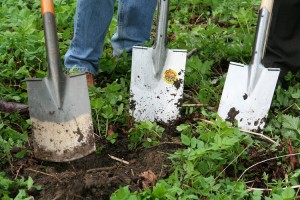The Master Gardeners visited Mentor Library's Main Branch on Wednesday and offered several tips on how to properly wake your garden.
1. Walk your garden
Step one is to get out there. See what needs to be done. Pull early weeds, check for winter damage, and plan how you want to use your available space.
2. Dealing with winter damage
If one of your plants is leaning, it may not need to be staked. Nature has a way of righting itself. However, if staking is necessary, be gentle. For broken branches, prune back to the next branch or node. If any of your plants have been heaved by the frozen ground, replant them at ground level.
3. Clean up
Cut your ornamental grasses back to six to 12 inches; remove old leaves from your perennials, as well as any dead plant material; and cut back any overgrown plants.
4. Pruning
No matter how overgrown a plant is, don't prune off more than 25 percent of it. Remove old and broken branches first. (Once again, cut back to the next branch or node.) If a plant is very overgrown, you have need to prune it over multiple seasons.
5. Lawn care
Sew seed as soon as the soil is workable. You'll want to wait until there's adequate moisture and the soil is about 50 degrees F. By the way, don't apply any pre-emergent herbicides if you're seeding or reseeding your lawn. However, if you're not seeding, you'll want to apply your pre-emergent herbicide in early April.
6. Fertilizing your lawn
If you applied fertilizer in the fall, you only need one application in either late April or early May. If you didn't, then you'll want two applications: one in late April, one in late May. The Master Gardener recommends slow-release fertilizer.
7. Mowing your lawn
Only cut a third of the height from your lawn at any given time. Any more than that will damage the plants.
8. Chemicals and herbicides
Get a soil test before you add anything to your soil. They're inexpensive and profoundly helpful. Don't use any chemical you don't need. You're just poisoning your soil and wasting your money.
9. Planting
In spring, you'll want to plant your bulbs, as well as some of your annual, perennials and flowering trees. And, whenever and whatever you plant, make sure to follow package instructions.
For more tips, check out the Master Gardeners website or the Lake County OSU Extension Office page. For specific advice, call the Master Gardeners advice line between 9 and 11 a.m. on Tuesdays and Thursdays: (440) 350-2582.
Finally, for all your green thumbs, Mentor Library launched a seed library on April 1.
Anyone with a MPL card in good standing can check out seeds from the library for their own garden. The library’s collection already includes more than 100 varieties of seed, including herbs, flowers, vegetables and fruit.
People can check out as many as 15 types of seed per year.
So let's get out there, and help Mentor grow.

No comments:
Post a Comment